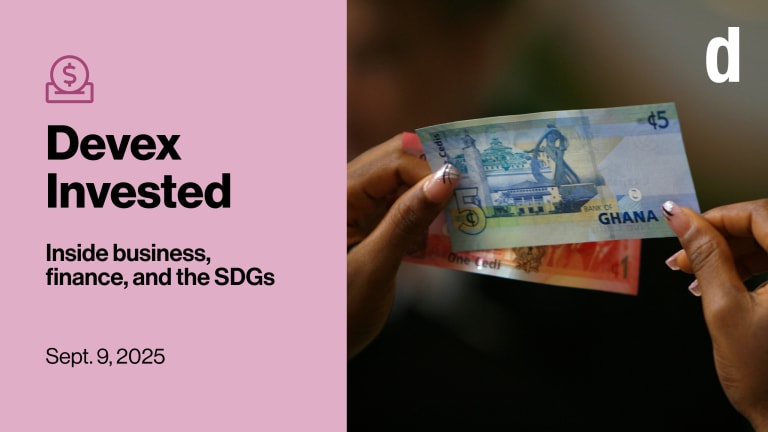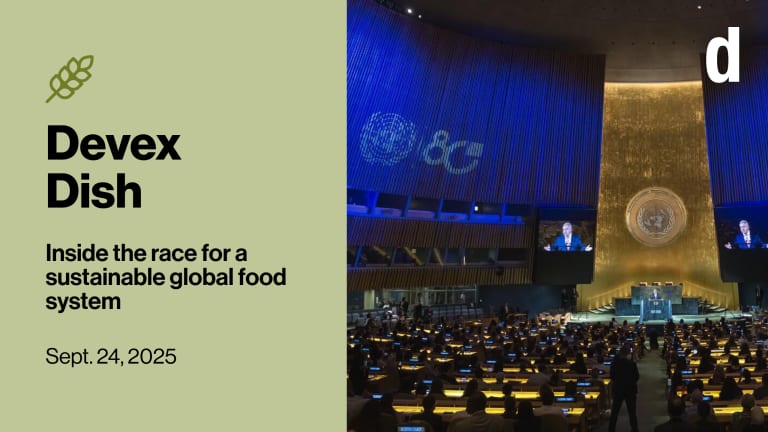
UNITED NATIONS — Lagging data collection on humanitarian work and crises across the United Nations may soon receive a boost by a new partnership with interactive data visualization company Tableau.
The partnership, announced in March, has not yet yielded sign on by any additional new U.N. agencies or partners, but it establishes the software company as the global visual analytics standard across the U.N. system. All U.N. organizations now have access to the Tableau system, which quickly sorts and visualizes data on a single dashboard. The Tableau Foundation — which issues grants of up to $1 million and offers on-the-ground training sessions — has engaged in other humanitarian and development data partnerships with international NGOs including PATH.
“The big thing is that — and this is true around the NGO sector globally — we all read about big data and [the] great potential it has, but many people actually do not know what that looks like for them in the work they are doing,” explained Neal Myrick, the global head of Tableau Foundation.
“One thing we are focused on is, if the project is successful, will it help people in the sector see and understand what is possible with data? People do not realize you can supply near real-time data to somebody on the ground in Zambia, and train that person to make decisions about how they could be allocating their time and resources.”
For existing partners such as the World Food Programme, which has worked with Tableau since 2015, that has meant a shift away from data presented in scheduled PDF bulletins to a real-time flow of information in critical food security situations. This fluidity of information can be key in understanding trends in remote or conflict areas that WFP staffers are not able to access in person.
“We’re collecting information on a near real-time or real-time basis, and are able to display the information on populations impacted by conflict where we cannot go and visit face-to-face,” explained Jonathan Rivers, a lead on the WFP’s mobile Vulnerability Analysis and Mapping team. “What the Tableau partnership allows us to do is to build these dashboards to absorb the information and display it as quickly as possible. [Data] is automated, so it flows into an analysis engine, flows into Tableau system and allows visualization to come out much more quickly.”
Q&A: UN IT chief Atefeh Riazi on the changing role of tech in development
Five years into the job, U.N. Chief Information Technology Officer Atefeh Riazi is increasingly thinking big picture about the role of technology in delivering on the U.N.'s global mandate, especially in service of the SDGs. In March, her office announced a partnership to use software by Seattle-based tech firm Tableau as the body’s global standard for data visualization.
The U.N. spends just 6-7 percent of its budget on IT — below the 12-19 percent standard in the private sector — and spending by the body has dropped $100 million over the last few years, the U.N.’s chief information technology officer, Atefeh Riazi, told Devex recently. She said part of the challenge is having the “right data.”
During the December 2017 launch of the Centre for Humanitarian Data in The Hague, U.N. Secretary-General António Guterres echoed Riazi’s sentiments. The new U.N. center aims to strengthen the speed and quality of humanitarian data.
“Accurate data is the lifeblood of good policy and decision-making,” Guterres said at the event. “Obtaining it, and sharing it across hundreds of organizations in the middle of a humanitarian emergency, is complicated and time consuming — but it is absolutely crucial.”
Another goal of the center is to increase the use of the Humanitarian Data Exchange, or HDX, an information sharing platform launched by the U.N. Office for the Coordination of Humanitarian Affairs in 2014. HDX, with more than 6,600 data sets and 360 supporting organizations, has also partnered with Tableau.
Can the UN's Centre for Humanitarian Data stand out?
Six months after its launch, the center is working on an ambitious agenda to increase the use and impact of data across aid — but does the sector need another data hub? Devex visited its head office in The Hague to find out.
It can be challenging to get datasets from organizations, which can see their data as an asset — “something that belongs to them,” according to Javier Teran Castro, the lead of the data partnerships team at HDX.
But “the idea is to have a place where humanitarians can find relevant data and share it,” he said.
In Yemen, where nearly 18 million people are food insecure, WFP has been using mobile phone calls and SMS surveys to collect assessment data at the most local level, connecting with over 3,000 households a month. Similar programs in Syria and northeast Nigeria are also underway.
“We ask things about whether people have enough food, what their dietary patterns are, look at coping strategies, basic demographics to look at representivity, information on basic economic status and educational status,” Rivers said. “We try to make sure data collection is continuing all the time, and are transitioning to this within the last three to six months. We want to keep it rolling and have some way of pulling it into our systems immediately, to display this as information comes in.”
The next step for WFP is to merge different data streams — combining subnational food market information with household food consumption, for example — to build a connected hunger map, according to Rivers. The World Bank is also working on a connected famine monitoring system.
This work could help address the challenge of tracking and studying data streams in isolation. If a particular area has seen an increase in food prices, for example, side-by-side data on droughts or spikes in conflict could help connect the dots, serving to “basically tell us what types of programming would be needed and what risks there would be to the programming if it were to proceed,” Rivers said.
“We’re talking about an anomaly monitoring system, so looking at data at a subnational level within countries where the deteriorating [food insecurity conditions] is marked past a point that needs verification,” he continued. “We’re not trying to compare Ghana to Yemen, but are trying to look at what is going on in Ghana and see if there are areas of deterioration and any areas that we would consider concerning.”








